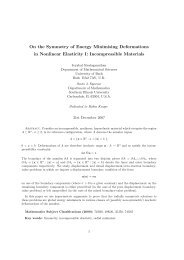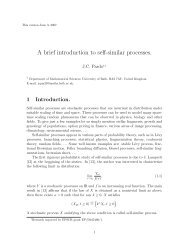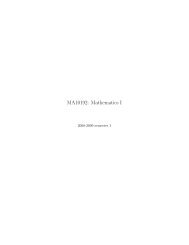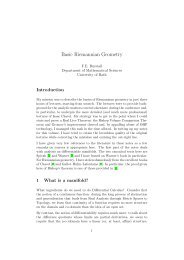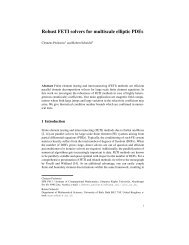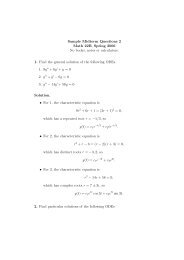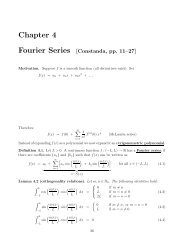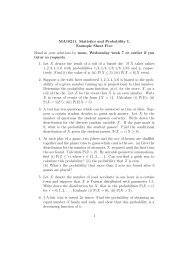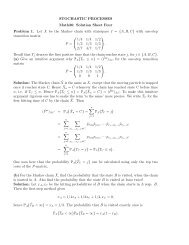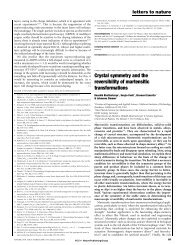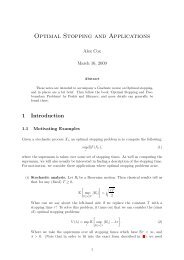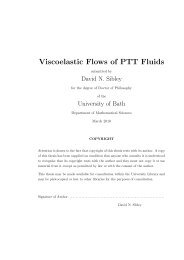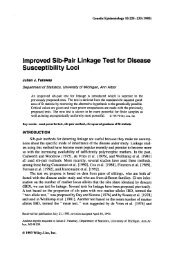4 The <strong>Lévy</strong>-Itô decomposition rigorouslyFix a time horizon T > 0. Let us assume that (Ω,F,{F t : t ∈ [0,T]},P) is afiltered probability space in which the filtration {F t : t ≥ 0} is complete withrespecttothe nullsets<strong>of</strong>P <strong>and</strong>rightcontinuousin thesensethat F t = ⋂ s>t F s.Definition 4.1 Fix T > 0. Define M 2 T = M2 T (Ω,F,{F t : t ∈ [0,T]},P) tobe the space <strong>of</strong> real valued, zero mean, almost surely right-continuous, squareintegrable P-martingales with respect to the given filtration over the finite timeperiod [0,T].One luxury that follows from the assumptions on {F t : t ≥ 0} is that anyzero mean square integrable martingalewith respect to this filtration has a rightcontinuous modification 4 which is also a member <strong>of</strong> M 2 T .If we quotient out the equivalent classes <strong>of</strong> versions 5 <strong>of</strong> each martingale, itis straightforward to deduce that M 2 T is a vector space over the real numberswith zero element M t = 0 for all t ∈ [0,T] <strong>and</strong> all ω ∈ Ω. In fact, as we shallshortly see, M 2 T is a Hilbert space6 with respect to the inner product〈M,N〉 = E(M T N T ),where M,N ∈ M 2 T . It is left to the reader to verify the fact that 〈·,·〉 forms aninner product. The only mild technical difficulty in this verification is showingthat for M ∈ M 2 T , 〈M,M〉 = 0 implies that M = 0, the zero element. Notehowever that if 〈M,M〉 = 0 then by Doob’s Maximal Inequality, which saysthat for M ∈ M 2 T ,( )E sup Ms20≤s≤T≤ 4E ( M 2 T),wehavethatsup 0≤t≤T |M t | = 0almostsurely. ItfollowsnecessarilythatM t = 0for all t ∈ [0,T] with probability one.As alluded to above, we can show without too much difficulty that M 2 T isa Hilbert space. To do that we are required to show that given {M (n) : n =1,2,...} is a Cauchy sequence <strong>of</strong> martingales taken from M 2 T then there existsan M ∈ M 2 T such that ∥ ∥∥M−M∥(n) ∥ → 04 Recall that M ′ = {M t ′ : t ∈ [0,T]} is a modification <strong>of</strong> M if for every t ≥ 0, we haveP(M t ′ = Mt) = 1.5 Recall that M ′ = {M t ′ : t ∈ [0,T]} is a version <strong>of</strong> M if it is defined on the same probabilityspace <strong>and</strong> {∃t ∈ [0,T] : M t ′ ≠ Mt} is measurable with zero probability. Note that if M′ is amodification <strong>of</strong> M then it is not necessarily a version <strong>of</strong> M. However, it is obviously the casethat if M ′ is a version <strong>of</strong> M then it also fulfils the requirement <strong>of</strong> being a modification.6 Recall that 〈·,·〉 : L ×L → R is an inner product on a vector space L over the reals if itsatisfies the following properties for f,g ∈ L <strong>and</strong> a,b ∈ R; (i) 〈af +bg,h〉 = a〈f,h〉+b〈g,h〉for all h ∈ L, (ii) 〈f,g〉 = 〈g,f〉, (iii) 〈f,f〉 ≥ 0 <strong>and</strong> (iv) 〈f,f〉 = 0 if <strong>and</strong> only if f = 0.For each f ∈ L let ||f|| = 〈f,f〉 1/2 . The pair (L,〈·,·〉) are said to form a Hilbert space if allsequences, {f n : n = 1,2,...} in L that satisfy ||f n−f m|| → 0 as m,n → ∞, so called Cauchysequences, have a limit which exists in L.18
as n ↑ ∞ where ‖·‖ := 〈·,·〉 1/2 . To this end let us assume that the sequence <strong>of</strong>processes { M (n) : n = 1,2,... } is a Cauchy sequence, in other words,{ [ (E M (m)T) ]} 2 1/2−M (n)T→ 0 as m,n ↑ ∞.Necessarily then the sequence <strong>of</strong> r<strong>and</strong>om variables {M (k)T: k ≥ 1} is a Cauchysequence in the Hilbert space <strong>of</strong> zero mean, square integrable r<strong>and</strong>om variablesdefined on (Ω,F T ,P), say L 2 (Ω,F T ,P), endowed with the inner product〈M,N〉 = E(MN). Hence there exists a limiting variable, say M T inL 2 (Ω,F T ,P) satisfying{ [E (M (n)T−M T ) 2]} 1/2→ 0as n ↑ ∞. Define the martingale M to be the right continuous version 7 <strong>of</strong>E(M T |F ∗ t ) for t ∈ [0,T]<strong>and</strong> note that by definition∥∥M (n) −M∥ → 0as n tends to infinity. Clearly it is an Ft ∗ -adapted process <strong>and</strong> by Jensen’sinequalityE ( Mt2 )= E(E(M T |Ft ∗ ) 2)≤ E ( E ( MT|F 2 t∗ ))= E ( MT2 )which is finite. Hence Cauchy sequences converge in M 2 T <strong>and</strong> we see that M2 Tis indeed a Hilbert space.Having reminded ourselves<strong>of</strong> some relevant properties <strong>of</strong> the space <strong>of</strong> squareintegrable martingales, let us consider a special class <strong>of</strong> martingale within thelatter class that are also <strong>Lévy</strong> processes <strong>and</strong> which are key to the pro<strong>of</strong> <strong>of</strong> the<strong>Lévy</strong>-Itô decomposition.Henceforth, we shall suppose that {ξ i : i ≥ 1} is a sequence <strong>of</strong> i.i.d. r<strong>and</strong>omvariables with common law F (which does not assign mass to the origin) <strong>and</strong>that N = {N t : t ≥ 0} is a Poisson process with rate λ > 0.Lemma 4.1 Suppose that ∫ |x|F(dx) < ∞.R(i) The process M = {M t : t ≥ 0} where∑N t ∫M t := ξ i −λt xF(dx)Ri=1is a martingale with respect to its natural filtration.7 Here we use the fact that {F ∗ t: t ∈ [0,T]} is complete <strong>and</strong> right continuous.19



